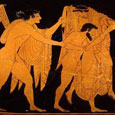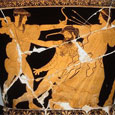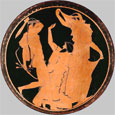TITYOS
Greek Name
Τιτυος
Transliteration
Tityos
Latin Spelling
Tityus
Translation
Suffers Retribution?
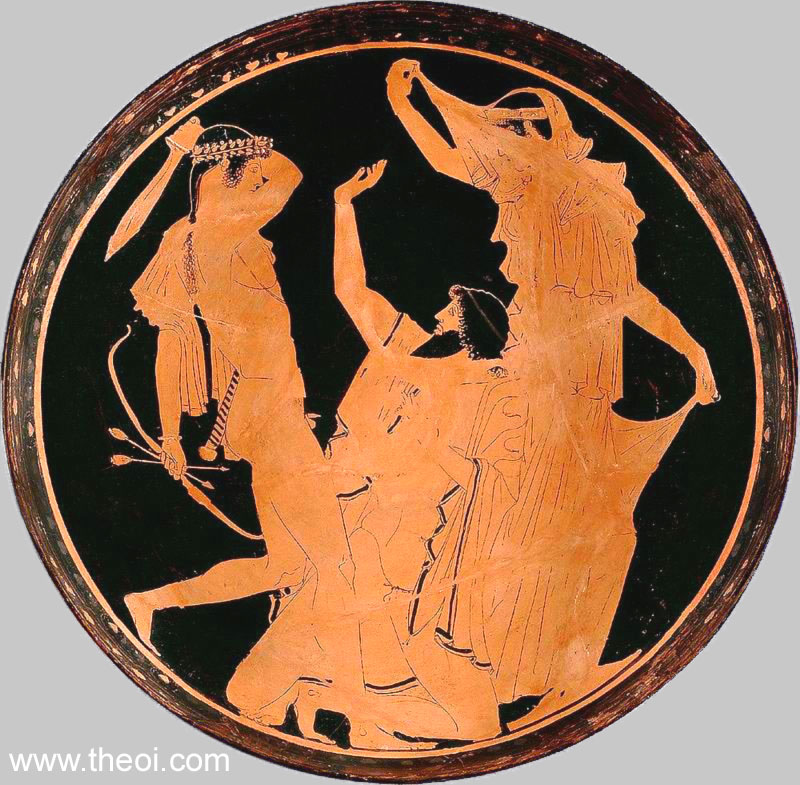
TITYOS (Tityus) was an Euboian or Phokian giant who assaulted the goddess Leto as she travelling to the shrine of Delphoi (Delphi). Her son Apollon quickly intervened and slew the giant with a volley of arrows and the blade of his golden sword. As further punishment for his crime, Tityos was staked to the ground in the underworld where two vultures were set to feed on his ever-regenerating liver.
Tityos' name is probably derived from the Greek word tisis meaning "he who suffers retribution." Alternatively he might be connected with the Tityroi, the flute-playing satyrs of Boiotian lore.
FAMILY OF TITYUS
PARENTS
[1.1] GAIA (Homer Odyssey 11.580, Virgil Aeneid
6.595, Dionysiaca 4.33)
[2.1] ELARE (Hesiod Catalogues Frag 24, Argonautica 1.758, Strabo 9.3.14)
[2.2] ZEUS & ELARE (Apollodorus 1.22)
OFFSPRING
[1.1] EUROPA (Pindar Pythian Ode 4 ep2)
ENCYCLOPEDIA
TI′TYUS (Tituos), a son of Gaea, or of Zeus and Elara, the daughter of Orchomenus, was a giant in Euboea, and the father of Europa. (Hom. Od. vii. 324; Apollod. i. 4. § 1; Schol. ad Apollon. Rhod. i. 181, 761; Pind. Pyth. iv. 81.) Instigated by Hera (Hygin. Fab. 55), he made an assault upon Leto or Artemis, when she passed through Panopaeus to Pytho, but was killed by the arrows of Artemis or Apollo, or, according to others, Zeus killed him with a flash of lightning. (Hygin. l.c. ; Schol. ad Apollon. i. 181; Paus. iii. 18. § 9 ; Pind. Pyth. iv. 160; Horat. Carm. iv. 6. § 2.) He was then cast into Tartarus, and there he lay outstretched on the ground, covering nine acres, and two vultures or snakes devoured his liver. (Hygin. l.c. ; Schol. ad Pind. Ol. i. 97 ; Hom. Od. xi. 576, &c.) His gigantic tomb was shown in aftertimes near Panopeus (Paus. x. 4. § 4), and his fall by the arrows of Artemis and Apollo was represented on the throne of Apollo at Amyclae. (Paus. iii. 18. § 9, x. 11. § 1, 29. § 2 ; comp. Strab. ix. p. 422; Virg. Aen. vi. 595; Ov. Met. iv. 457, Epist. ex Pont. i. 2. 41.)
Source: Dictionary of Greek and Roman Biography and Mythology.
CLASSICAL LITERATURE QUOTES
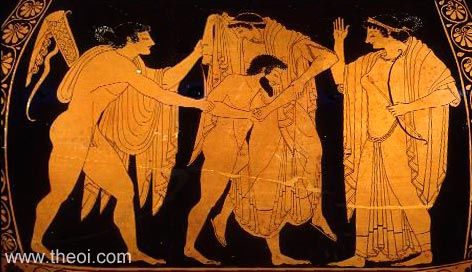
Homer, Odyssey 7. 324 (trans. Shewring) (Greek epic C8th B.C.) :
"[King Alkinoos (Alcinous) of the Phaiakes (Phaeacians) speaks :] ‘That [the Greek island of Euboia
(Euboea)] is the furthest point of all--so say those of our people who once set eyes on it when they carried
yellow-haired Rhadamanthys to visit Tityos (Tityus) son of Gaia (Gaea, the Earth).’"
Homer, Odyssey 11. 576 :
"[Odysseus recalls the shades of the dead he saw in the underworld :] ‘I saw Tityos (Tityus) also,
son of the mighty goddess Gaia (Earth); he lay on the ground, his bulk stretched out over nine roods
(plethra). Two vultures, one on each side of him, sat and kept plucking at his liver, reaching down to
the very bowels; he could not beat them off with his hands. And this was because he had once assaulted a
mistress of Zeus himself, the far-famed Leto, as she walked towards Pytho through the lovely spaces of
Panopeus.’"
[N.B. The Greek plethron is a length of approximately 30 meters or 100 feet. So the nine
plethra giant was 270 meters or 900 feet tall.]
Hesiod, Catalogue of Women Frag 25 (from Herodian in Etymologicum Magnum) (trans.
Evelyn-White) (Greek epic C8th or C7th B.C.) :
"Tityos (Tityus) the son of Elara."
Pindar, Pythian Ode 4 ep 2 (trans. Conway) (Greek lyric C5th B.C.) :
"That prince [Euphemos one of the Argonauts], son of the horseman's god Poseidon--whom Europa, Tityos'
daughter bore by Kephissos' (Cephissus') banks."
Pindar, Pythian Ode 4 ep 4 :
"Indeed Tityos (Tityus) by Artemis was hunted down with darts from her unconquerable quiver suddenly sped,
so that a man may learn to touch only those loves that are within his power."
Pseudo-Apollodorus, Bibliotheca 1. 22 (trans. Aldrich) (Greek mythographer C2nd A.D.)
:
"Tityos (Tityus) son of Zeus and Okrhomenos' (Orchomenus') daughter Elare (Elara). After Zeus had seduced
Elare, in fear of Hera he hid her beneath the earth, where she gave birth to their enormous son Tityos, and led
him forth into the light of day.Tityos saw Leto when she came to Pytho and in a fit of passion tried to embrace
her. But she called out to her children, who shot him dead with arrows. He is being punished even in death, for
vultures feast on his heart in Hades' realm."
Apollonius Rhodius, Argonautica 1. 758 ff (trans. Rieu) (Greek epic C3rd B.C.)
:
"[Depicted on the cloak of Iason (Jason) crafted by Athene :] And here was Phoibos (Phoebus) Apollon,
pictured as a sturdy youth shooting an arrow at the gigantic Tityos (Tityus), who was boldly dragging off his
mother Leto by her veil. Tityos was lady Elare' son; but he was nursed and born by Mother Gaia (Gaea, the
Earth)."
Callimachus, Hymn 3 to Artemis 109 (trans. Mair) (Greek poet C3rd B.C.) :
"Artemis, Lady of Maidenhood, Slayer of Tityos."
Quintus Smyrnaeus, Fall of Troy 3. 390 ff (trans. Way) (Greek epic C4th A.D.)
:
"As lay Tityos (Tityus), who sought to force Queen Leto, when she fared to Pytho: swiftly in his wrath
Apollon shot, and laid him low, who seemed invincible: in a foul lake of gore there lay he, covering many a rood
of ground, on the broad earth, his mother; and she moaned over her son, of blessed Gods abhorred; but Lady Leto
laughed."
Strabo, Geography 9. 3. 12 (trans. Jones) (Greek geographer C1st B.C. to C1st A.D.) :
"Apollon, visiting the land [of Phokis (Phocis)], civilized the people by introducing cultivated fruits and
cultured modes of life . . . when he arrived at the land of the Panopaians he destroyed Tityos, a violent and
lawless man who ruled there; and that the Parnassians joined him and informed him of another cruel man named
Python and known as the Drakon (Dragon)."
Strabo, Geography 9. 3. 14 :
"Panopeios [in Phokis], the Phanoteios of today . . . the scene of the myth of Tityos (Tityus) is laid
here. Homer says that ‘the Phaiakes (Phaeacians) led Rhadamanthys into Euboia (Euboea) to see Tityos, son
of Ge (Gaea, the Earth).’ And a cave called Elarion (Elarium) is to be seen in the island [of Euboia],
named after Elara the mother of Tityos; and also a hero-temple of Tityos, and certain honors which are paid to
him."
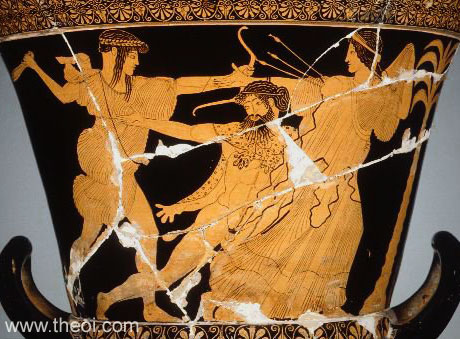
Pausanias, Description of Greece 10. 11. 1 (trans. Jones) (Greek travelogue C2nd
A.D.) :
"The Knidians (Cnidians) brought the following images to Delphoi (Dlphi) : . . . Leto, and Apollon and
Artemis shooting arrows at Tityos, who has already been wounded in the body."
Pausanias, Description of Greece 3. 18. 15 :
"[Amongst the scenes depicted on the throne of Apollon at Amyklai (Amyclae) near Sparta:] . . . Apollon and
Artemis are shooting Tityos."
Pseudo-Hyginus, Fabulae 55 (trans. Grant) (Roman mythographer C2nd A.D.) :
"Because Latona [Leto] had lain with Jove [Zeus], Juno [Hera] ordered Tityus, a creature of immense size,
to offer violence to her. When he tried to do this he was slain by the thunderbolt of Jove. He is said to lie
stretched out over nine acres in the Land of the Dead, and a serpent is put near him to eat out his liver, which
grows again with the new moon."
Ovid, Metamorphoses 4. 453 ff (trans. Melville) (Roman epic C1st B.C. to C1st A.D.)
:
"The [Erinyes sits] guarding the dungeon's adamantine doors, and combed the black snakes hanging in their
hair . . . ‘The Dungeon of the Damned’ that place is called. There giant Tityos (Tityus) lies
stretched across nine acres and provides his vitals for the vultures.'"
Virgil, Aeneid 6. 595 ff (trans. Day-Lewis) (Roman epic C1st B.C.) :
"Tityus too, the nursling of Tellus (Earth) [Gaia] who mothers all, was to be seen [in Tartaros], his body
pegged out over a full nine acres, a huge vulture with hooked beak gnawing for ever his inexhaustible liver, the
guts that are rich in torment, pecking away for its food, burrowing deep through the body it lives in, and
giving no rest to the always-replenishing vitals."
Propertius, Elegies 2. 20 (trans. Goold) (Roman elegy C1st B.C.) :
"May one among Tityus' vultures range to be my punishment."
Propertius, Elegies 3. 5 :
"Whether in the world below exist assizes of gods and punishments of sinners, the wheel, the rolling rock,
the thirst in the water's midst . . . and nine acres are all too few for Tityus."
Seneca, Hercules Furens 747 ff (trans. Miller) (Roman tragedy C1st A.D.) :
"Does any certain place [in the underworld] enclose the guilty? and, as rumour has it, do sinners suffer
cruel punishment in bonds unending? . . .
[There] to the vulture Tityos gives never-ending feasts."
Seneca, Hercules Furens 976 ff :
"[Herakles', driven mad, has visions of monsters :] ‘What's this? The baleful Gigantes (Giants) are
taking arms. Tityos has escaped the shades and, with breast all torn and empty, has almost reached the
sky.’"
Seneca, Phaedra 1229 ff :
"Ye guilty shades [in the underworld], make room . . . let the fell vulture leave Tityus and fly hither,
let my liver constantly grow afresh for punishment."
Statius, Thebaid 1. 710 (trans. Mozley) (Roman epic C1st A.D.) :
"For thy [Apollon's] mother's honour dost stretch the earth-born Tityos on the Stygian sands."
Statius, Thebaid 6. 751 :
"This one [a competitor in wrestling] is as great in broad expanse of every limb and terrible in size of
bone as though Tityos should rise up from thte Stygian fields, did the fierce birds allow him."
Statius, Thebaid 11. 12 :
"As vast as in Avernus lies outstretched the defiler [Tityos] of Apollo's mother [Leto], whom even the
birds held aghast when they emerge from his cavernous breast and view his huge extended limbs, while the
wretched fibres grow again to feed them."
Nonnus, Dionysiaca 20. 35 ff (trans. Rouse) (Greek epic C5th A.D.) :
"In Olympos I shrink from Leto, still a proud braggart, when she holds up at me the arrow that defended her
bed and slew Tityos the lustful giant."
Nonnus, Dionysiaca 4. 331 ff :
"The city of Tityos [in Phokis (Phocis)], where that bold son of Gaia (Earth) marching through the
fair-leafy woods of Panopeus lifted the sacred robe of Leto and attempted violence."
Nonnus, Dionysiaca 48. 395 :
"[Nemesisgoddess of retribution addresses Artemis :] ‘What impious son of Earth persecutes you? . . .
Has Tityos risen again rolling a lovemad eye, and touched the robe of your untouchable mother [Leto]? Where is
your bow, Artemis, where are Apollon's arrows?’"
Suidas s.v. Gaieios (trans. Suda On Line) (Byzantine Greek Lexicon C10th A.D.)
:
"Gaieios : Personal name. The son of the earth." [I.e. an epithet of Tityos.]
ANCIENT GREEK ART
SOURCES
GREEK
- Homer, The Odyssey - Greek Epic C8th B.C.
- Hesiod, Catalogues of Women Fragments - Greek Epic C8th - 7th B.C.
- Pindar, Odes - Greek Lyric C5th B.C.
- Apollodorus, The Library - Greek Mythography C2nd A.D.
- Apollonius Rhodius, The Argonautica - Greek Epic C3rd B.C.
- Callimachus, Hymns - Greek Poetry C3rd B.C.
- Strabo, Geography - Greek Geography C1st B.C. - C1st A.D.
- Pausanias, Description of Greece - Greek Travelogue C2nd A.D.
- Quintus Smyrnaeus, Fall of Troy - Greek Epic C4th A.D.
- Nonnus, Dionysiaca - Greek Epic C5th A.D.
ROMAN
- Hyginus, Fabulae - Latin Mythography C2nd A.D.
- Ovid, Metamorphoses - Latin Epic C1st B.C. - C1st A.D.
- Virgil, Aeneid - Latin Epic C1st B.C.
- Propertius, Elegies - Latin Elegy C1st B.C.
- Seneca, Hercules Furens - Latin Tragedy C1st A.D.
- Seneca, Phaedra - Latin Tragedy C1st A.D.
- Statius, Thebaid - Latin Epic C1st A.D.
BYZANTINE
- Suidas, The Suda - Byzantine Greek Lexicon C10th A.D.
BIBLIOGRAPHY
A complete bibliography of the translations quoted on this page.
